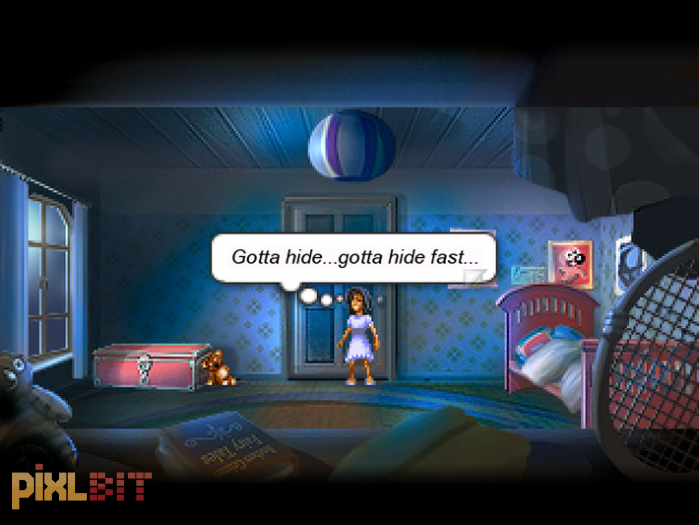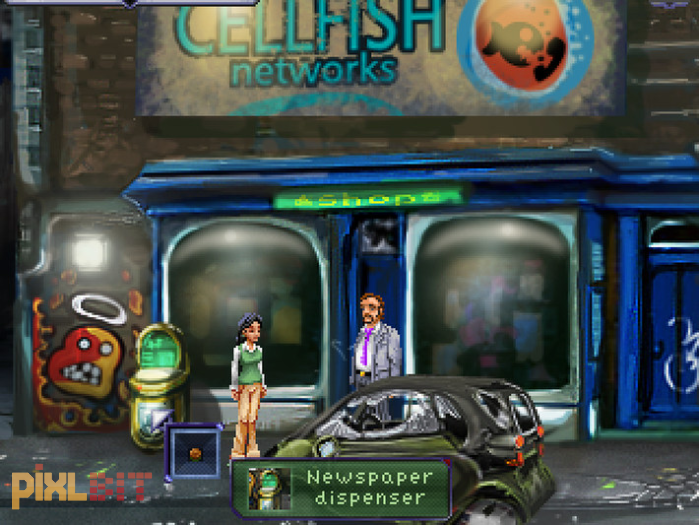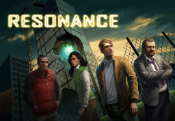Resonance Review
|
|
See PixlBit's Review Policies

On 08/13/2012 at 05:00 PM by Julian Titus So a scientist, a reporter, a doctor, and a detective walk into a bar... |

A must own for fans of classic point-and-click adventure games.
The point and click adventure game—such a prolific part of PC gaming in the ‘90s—has seen a renaissance in recent years. A large part of that is thanks to the episodic releases of Telltale Games, as well as the proliferation of Kickstarter breathing new life into old IPs. But by and large these games are trading in on gamer nostalgia. You remember Leisure Suit Larry, don’t you? How about Escape From Monkey Island? While revisiting those classic games can be fun, there’s something to be said about having an original title that hits the same beats as those old adventure games. That’s exactly what XII Games has done with Resonance—a new adventure game that could have easily occupied shelf space right next to Full Throttle and Day of the Tentacle.
Resonance is an interwoven story that connects the lives of four seemingly random people. There’s Tolstoy Eddings the scientist, Anna Castellanos the doctor, Ray Abbot the reporter (don’t you dare call him a blogger), and Winston Bennett, the detective that’s getting too old for this stuff.
A freak explosion at a lab results in a city wide blackout that plunges Aventine City into chaos and leaves a brilliant scientist the victim of murder most foul. Our four protagonists are the only people who suspect the truth behind the mysterious event, and they must work together to not only find a killer and discover the secret of Resonance but stay one step ahead of the shadowy figures who want them dead.
As I mentioned earlier, Resonance is a traditional point and click adventure game. Unlike the popular Telltale games that use fancy 3D graphics to tell their stories, Resonance looks like it was plucked out of 1993, and I say that in the best possible way. The sprite-based graphics bring back warm and fuzzy memories of the hours I spent playing games like King’s Quest VI and Space Quest IV (Yes, I was a Sierra fan, so all of you Lucasarts worshippers can express your displeasure in the comments).
If you missed out on those older adventure games you would be forgiven for assuming that Resonance is hard on the eyes. But the crisp pixel art makes finding the environmental objects you can interact with a breeze. Adventure games are, at the end of the day, all about searching your surroundings carefully for that item or point of interest that will allow you to proceed, and Resonance is as traditional as it gets here. It was rare that I would miss something important, and I was pleased that XII Games decided to utilize the classic sprite graphics of the games that inspired them.
That’s shouldn’t imply that Resonance doesn’t do anything new or interesting with the adventure game formula, however. The core hook of its gameplay revolves around Long Term Memory (LTM) and Short Term Memory (STM). Long Term Memory gets added into a character’s file as he or she witnesses key events in the story. As the player, you can drag any item or environmental object into your Short Term Memory at any time. As you talk to other characters you can drop pertinent information from either your LTM or STM into the discussion. You can pretty much add anything you want into your STM so it’s good to get in the habit of doing so. Sometimes this will just give you an extra snippet of story, but the key to success in Resonance is to have the correct information to bring into a conversation. This sometimes resulted in my having to backtrack because I neglected to save the right item into my Short Term Memory, but once I got used to taking note of important data I found the memory system to be unique and gave me the feeling of accomplishing my goals in a logical fashion.
Well, that was most of the time, anyway. Resonance falls into the trap that some of those older adventure games did by giving you the ability to really screw yourself over. You may pass over one little tidbit of information that is super important later on, or you might somehow not notice an item that you didn’t realize you could pick up. While I didn’t get myself into a fail state because of things like this I did have to backtrack on numerous occasions, even as I tried to be thorough. There’s also that classic issue of certain solutions not making much logical sense, where your best option is to cycle through your inventory and try using everything on everything. Talking to your other characters sometimes gives you helpful clues, but expect a couple places to elicit some serious head scratching.
Resonance is a great homage to classic PC adventure games. It’s cleverly written with plenty of amusing dialogue and a story that winds around in some nail-biting ways. It also doesn’t overstay its welcome, coming in at a nice length that doesn’t seem too long or too short, but adds some replay thanks to an achievement system and the ability to score points for a “perfect game." A few of the puzzles slow down the forward momentum, but from its flashy introduction to its surprising conclusion, Resonance is a game worth sticking with.











Comments